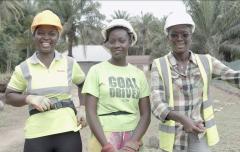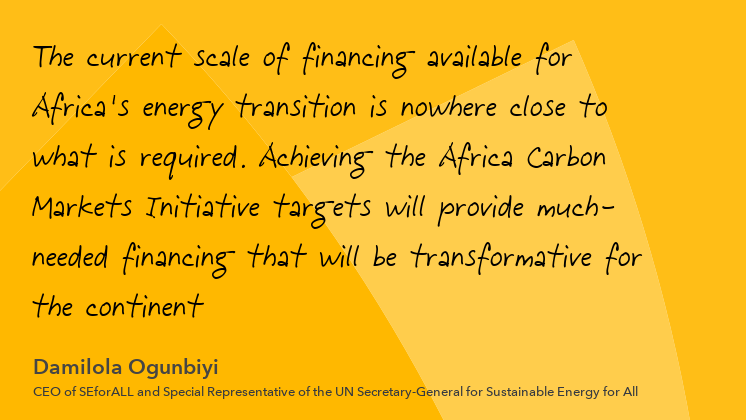Africa Carbon Markets Initiative inaugurated at COP27
Carbon markets offer an incredible opportunity to unlock billions for the climate finance needs of African economies while expanding energy access, creating jobs, protecting biodiversity, and driving climate action. However, Africa currently produces only a tiny percentage of its carbon credit potential.
Led by a thirteen-member steering committee of African leaders, CEOs, and carbon credit experts, the Africa Carbon Markets Initiative (ACMI) was launched on November 8th, with the aim of dramatically expanding Africa’s participation in voluntary carbon markets. The initiative was inaugurated at COP 27 in collaboration with The Global Energy Alliance for People and Planet (GEAPP), Sustainable Energy for All (SEforALL), and the UN Economic Commission for Africa, with the support of the UN Climate Change High Level Champions – Dr. Mahmoud Mohieldin and Nigel Topping.
ACMI’s principal goals by 2030
300 m
Produce 300 million carbon credits annually
6 bn $
Unlock 6 billion in revenue
30 m
Support 30 million jobs
ACMI announced a bold ambition for the continent—to reach 300 million credits produced annually by 2030. This level of production would unlock 6 billion in income and support 30 million jobs. By 2050, ACMI is targeting over 1.5 billion credits produced annually in Africa, leveraging over $120 billion and supporting over 110 million jobs. Commenting on ACMI’s ambition, Damilola Ogunbiyi, the CEO of SEforALL and Special Representative of the UN Secretary-General for Sustainable Energy for All and Co-Chair of UN-Energy, and a member of the ACMI’s steering committee, said, “The current scale of financing available for Africa’s energy transition is nowhere close to what is required. Achieving the Africa Carbon Markets Initiative targets will provide much-needed financing that will be transformative for the continent.”
ACMI’s principal goals by 2050
1.5 bn
Produce 1.5 million carbon credits annually
129 bn
Unlock 120 billion in revenue
110 m
Support over 110 million jobs
“I appreciate African Carbon Markets Initiative (ACMI) recognition of the tremendous potential for governments and the private sector to work together to catalyze private capital to accelerate clean energy transitions in Africa — which I believe can be done credibly, transparently, and in line with science.” John Kerry, US Special Presidential Envoy for Climate
Crucially, ACMI is committed to supporting high-integrity credits where an equitable and transparent distribution of revenue goes to communities. ACMI steering committee member and USAID Chief Climate Officer Gillian Caldwell noted, “The African voluntary carbon market will only succeed if people trust that African credits are driving real climate action and having a positive human impact. As the VCM scales in Africa, USAID and ACMI will ensure that it does so with integrity as a core pillar.” To stimulate the production of high-integrity credits, the ACMI is collaborating with global integrity initiatives like the Integrity Council for the Voluntary Carbon Market (IC-VCM) and the Voluntary Carbon Markets Integrity Initiative (VCMI), as well as other regional carbon market platforms.
US Special Presidential Envoy for Climate John Kerry said, “I appreciate African Carbon Markets Initiative (ACMI) recognition of the tremendous potential for governments and the private sector to work together to catalyze private capital to accelerate clean energy transitions in Africa — which I believe can be done credibly, transparently, and in line with science.”
ACMI released Africa Carbon Markets Initiative, Roadmap report: Harnessing carbon markets for Africa at the initiative’s COP 27 launch event. The report identifies 13 action programs to support the growth of voluntary carbon markets (VCMs) on the continent. Although voluntary carbon markets are already growing quickly—retirements of African credits have grown by an average of 36% annually over the past five years—aggressive action will be required to maintain this level of growth over the coming decades.
Multiple African nations including Kenya, Malawi, Gabon, Nigeria and Togo shared their commitment to collaborating with ACMI to scale carbon credit production via voluntary carbon market activation plans. Together, these 7 countries have a maximum potential to generate ~300+ MtCO2e. Even capturing 25% of this potential, ~75 MtCO2e would be double the total credits issued across the entire continent in 2021. Commenting on the announcement, Vice President of Nigeria and ACMI steering committee member H.E Yemi Osinbajo said, “Carbon markets can deliver tremendous benefits for Nigeria and for Africa—creating jobs, driving green investment, and reducing emissions. Nigeria is putting the groundwork in place today so that in subsequent years, carbon credits become a major industry that will benefit our people.”
ACMI is also working with major carbon credit buyers and financiers, such as Exchange Trading Group, Nando’s, and Standard Chartered, to set up an advance market commitment for hundreds of millions of dollars for high-integrity African carbon credits. For example, mobilizing $500 million, at an average price of $10 per carbon credit, could support the development and delivery of at least 50 MtCO2e, which is equivalent to the total credits retired from Africa from 2010 through 2020. Following the lead of other ACMs in the space, ACMI intends to send a strong demand signal for carbon credits across all project types – especially those where Africa has untapped potential. These include nature-based solutions, renewable energy projects, cookstoves, and more.
”Carbon markets can deliver tremendous benefits for Nigeria and for Africa—creating jobs, driving green investment, and reducing emissions. Nigeria is putting the groundwork in place today so that in subsequent years, carbon credits become a major industry that will benefit our people.” H.E Yemi Osinbajo, Vice President of Nigeria and ACMI steering committee member
The initiative intends to promote demand for existing credits, or those already in development, as well as for products and innovative project types that don’t yet have a market and can substantively contribute to economic prosperity, livelihoods, and environmental preservation across the continent (e.g., diesel decommissioning or biodiversity credits).
Ivan Duque, former President of Colombia, and David Antonioli, CEO of Verra, announced the creation of a new consortium, the Nature Framework Development Group. This partnership across Conservation International, Verra, International Union for Conservation of Nature, Conservation Finance Alliance, The Biodiversity Consultancy, Great Barrier Reef Foundation, and Blue Nature Alliance with support from McKinsey & Company, aims to develop a market leading nature/biodiversity credit. President Duque, who made the announcement as a member of ACMI’s steering committee commented, “by creating nature/biodiversity credits, the consortium aims to unlock new flows of financing for the protection of biodiversity and critical ecosystems.” Bogolo Kenewendo, Africa Director for the UN Climate Change High Level Champions noted the importance of adequately valuing both carbon and other nature benefits, “To maximize the value of Africa’s ecosystems, it is essential that there is a fair price for carbon credits, as well as the ability to be paid for the additional nature benefits beyond carbon, such biodiversity and water.”
ACMI aims to encourage conversation, coordination, and action towards the development of African voluntary carbon markets. Steering committee member and Vice President, Africa at the Global Energy Alliance for People and Planet Joseph Nganga called for everyone to contribute to this important effort: “Sustaining the rapid growth of African carbon markets isn’t going to happen accidently, it’s going to require action by governments, developers, and buyers. Together, we can unlock billions for climate finance and economic development in Africa.”
Related content

Blog
05 Feb 2026

Press release
26 Jan 2026

Press release
26 Jan 2026

News
19 Jan 2026

